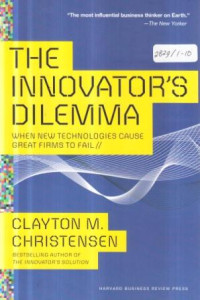Text
The innovator's dilema : when new technologies cause great firms to fail
In 19901 began asking the two questions that would eventually help shape this book. First, "Why is success so difficult to sustain?" And second, "Is successful innovation really as unpredictable as the data suggests?" By that time I'd been a strategist at the Boston Consulting Group, where I'd had unusual opportuni¬ties to see at every level how companies competed, and I had cofounded CPS Technologies to commercialize advanced-materials technology developed in MIT labs. But neither career path had yet to fuliy answer those two questions that were keeping me up at night.
So, at thirty-eight, with the support of my wife and months before our fifth child was born, I became a doctoral student and made those questions my life's work. I'm happy to say I got the answer to the first, and—with the continued help of tremendous colleagues drawn to the subject over the last two decades—I'm still homing in on the second. In this new edition of The Innovator's Dilemma, I'll show you some of the exciting new research we've conducted since the book was first published two decades ago.
Why is success so difficult to sustain? This was, and still is, an import¬ant question, because when you look across the sweep of business history, most companies that once seemed successful—the best practitioners of best practice—were in the middle of the pack (or, worse, the back of it) a decade or two later. And we discovered something unsettling and counterintuitive
Ketersediaan
Informasi Detail
- Judul Seri
-
-
- No. Panggil
-
650.1 Chr i
- Penerbit
- Boston : Harvard Business Review Press., 2016
- Deskripsi Fisik
-
xxxii, 254 hal. : il. ; 21 cm.
- Bahasa
-
English
- ISBN/ISSN
-
9781633691780
- Klasifikasi
-
650.1
- Tipe Isi
-
-
- Tipe Media
-
-
- Tipe Pembawa
-
-
- Edisi
-
-
- Subjek
- Info Detail Spesifik
-
-
- Pernyataan Tanggungjawab
-
-
Versi lain/terkait
Tidak tersedia versi lain
Lampiran Berkas
Komentar
Anda harus masuk sebelum memberikan komentar

 Karya Umum
Karya Umum  Filsafat
Filsafat  Agama
Agama  Ilmu-ilmu Sosial
Ilmu-ilmu Sosial  Bahasa
Bahasa  Ilmu-ilmu Murni
Ilmu-ilmu Murni  Ilmu-ilmu Terapan
Ilmu-ilmu Terapan  Kesenian, Hiburan, dan Olahraga
Kesenian, Hiburan, dan Olahraga  Kesusastraan
Kesusastraan  Geografi dan Sejarah
Geografi dan Sejarah